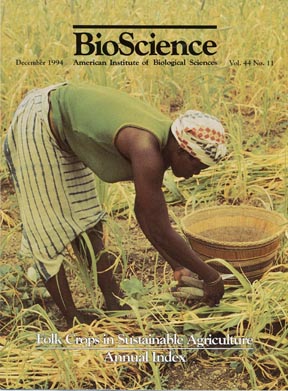Cleveland,
David A., Daniela Soleri, and Steven E. Smith. 1994. Do folk crop varieties
have a role in sustainable agriculture? BioScience 44(11):740-751.
ARTICLE AS PDF FILE.
ABSTRACT
Incorporating folk varieties into the development of locally based agriculture may be the best approach for sustainable agriculture; farmer management of selection supports long-term yield stability adapted to local conditions and cultural values.
CONCLUSION
Current data and theory reviewed here suggest that farmer control and
management of selection is the most practical and effective way of managing
genetic resources that supports long-term yield stability, and is specifically
adapted to the local environment, and to local farming systems including
social organization and cultural values. If this hypothesis is supported
by further research, existing folk varieties will have an important role
to play in the development of sustainable agriculture as we have defined
it here. This includes the improvement of some folk varieties by further
farmer-managed selection, and new folk varieties developed by introducing
new genetic resources, including those of modern varieties.

|
The incorporation of folk varieties into the development of locally-based and locally-controlled agriculture may be the best approach not only to conserving the genetic diversity in folk varieties and the farming systems that contain them, but to supporting sustainable farming systems grounded in local environments and cultural values. |